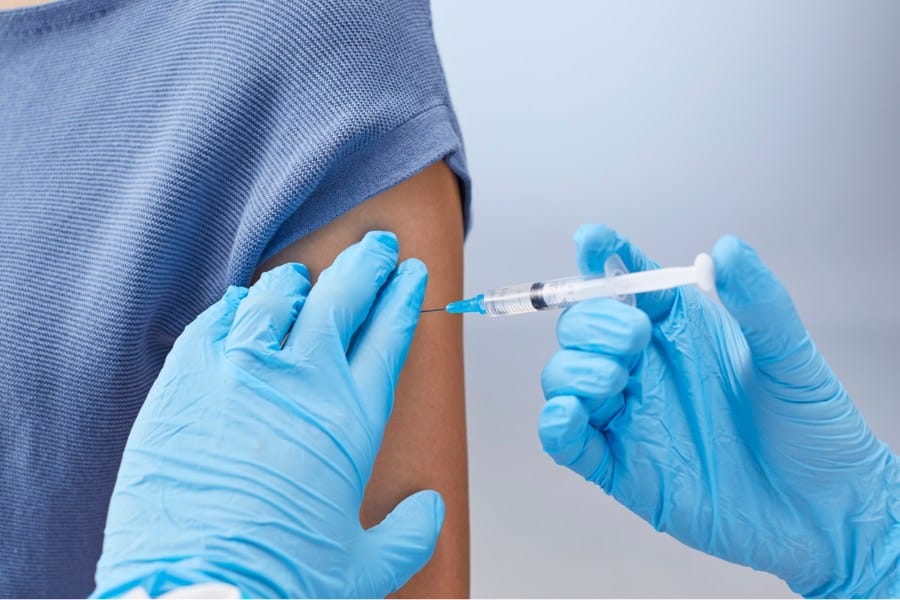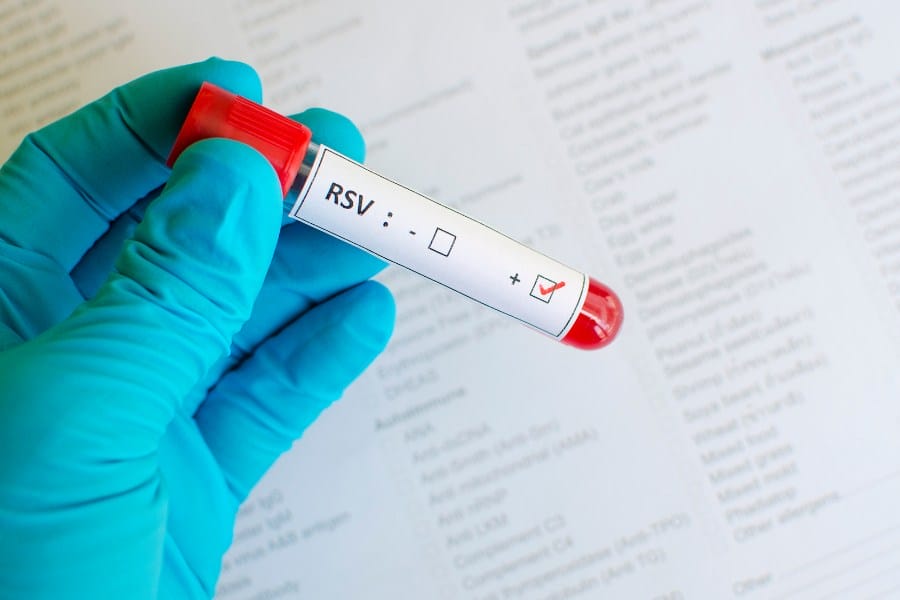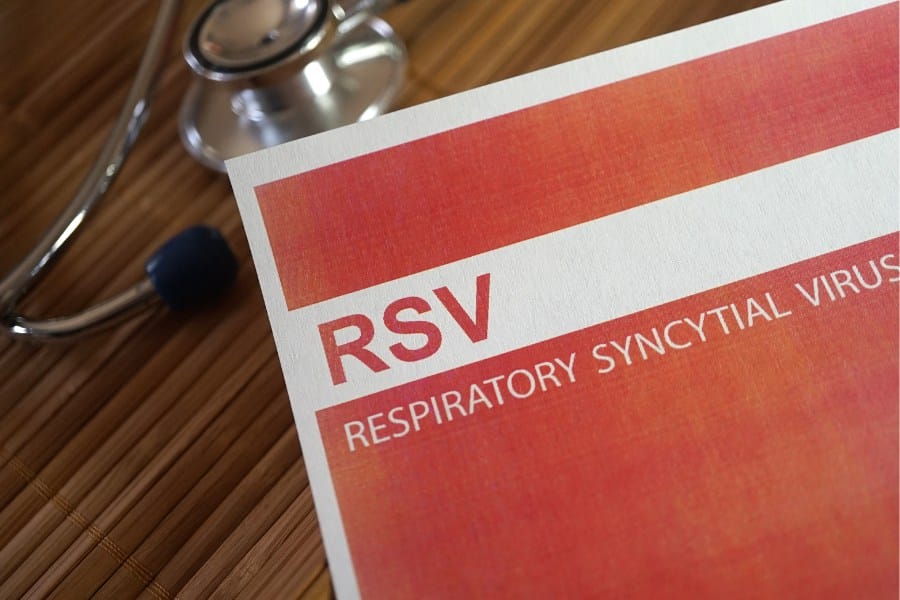Who Should Get an RSV Vaccine?
Respiratory syncytial virus (RSV) affects millions of people each year, causing symptoms ranging from mild cold-like illness to severe respiratory complications requiring hospitalization.
While most healthy adults experience only minor symptoms, RSV poses significant health risks for older adults, pregnant women, and individuals with underlying medical conditions.
Understanding RSV vaccination options and prevention strategies can help protect you and your loved ones from this highly contagious virus.
Key Takeaways:
- RSV spreads easily and affects everyone – The virus transmits through respiratory droplets and direct contact, with nearly all children infected by age two and adults experiencing multiple infections throughout their lives.
- High-risk groups need protection – Adults 75 and older, those 50-74 with underlying conditions, and pregnant women should prioritize RSV vaccination to prevent severe complications like pneumonia and bronchiolitis.
- Three FDA-approved vaccines available – Arexvy (GSK), Abrysvo (Pfizer), and mRESVIA (Moderna) provide at least two years of protection with a single dose for adults 50 and older.
- Optimal vaccination timing matters – While available year-round, getting vaccinated during August through October offers the best protection before RSV season begins in most U.S. communities.
What is the RSV Vaccine?
The RSV vaccine provides protection against the respiratory syncytial virus (RSV).
RSV is a typical cause of coughs and colds. Most people experience it multiple times in their lives.
It normally heals by itself, however in some people (particularly babies and older adults), it can cause ailments such as:
- Pneumonia (a lung illness) and bronchiolitis (a chest infection affecting infants).
- These infections can lead to major breathing issues. They may require hospitalization and are potentially fatal.
If you have a lung ailment like chronic obstructive pulmonary disorder (COPD), getting RSV might exacerbate your symptoms.
The RSV vaccine reduces the risk of major respiratory issues such as pneumonia and bronchiolitis.
Who Should Get an RSV Vaccine?

The CDC recommends an RSV vaccine for individuals 75 and older, as well as those aged 50-74 who are at higher risk of severe RSV.
Factors that raise your risk for serious disease are:
- Chronic heart or lung disease.
- Weakened immune system.
- Living in a nursing home
- Particular underlying medical conditions
Is the RSV Vaccine Approved in the United States?
The United States Food and Drug Administration (FDA) has approved three RSV vaccinations for persons aged 60 and up.
This includes:
- Arexvy (GSK)
- Abrysvo (Pfizer)
- mRESVIA (Moderna)
The CDC recommends that persons 60 and older get an RSV immunization after consulting with their doctor or another health care professional.
How Do You Get RSV?

RSV spreads as easily as the common cold and can be contracted anywhere. Nearly all children become infected with RSV before reaching their second birthday.
The virus transmits through respiratory droplets when infected individuals cough or sneeze, as well as through direct contact such as touching or kissing.
Infected people typically remain contagious for three to eight days, with transmission possible one to two days before symptoms appear. Infants and individuals with compromised immune systems may spread the virus for up to four weeks.
RSV poses serious health risks for people with underlying conditions, including:
- Chronic respiratory diseases like COPD or asthma
- Cardiovascular conditions such as congestive heart failure and coronary artery disease
- Kidney disease, liver disorders, blood disorders, neurological conditions, or endocrine disorders, including diabetes
Severe RSV infections can lead to complications requiring hospitalization when patients cannot recover at home. These cases may become life-threatening.
Adults hospitalized due to RSV typically have pre-existing medical conditions, with many patients having three or more underlying health issues. If you’ve been exposed to someone with RSV or are infected yourself, frequent hand washing is essential for preventing further transmission.
How is the RSV Vaccine Given?
The RSV vaccine is administered through an injection in the upper arm.
Unlike seasonal vaccines such as flu or COVID-19 shots, RSV vaccination is available throughout the entire year.
Pregnant women should receive the RSV vaccine during each pregnancy to ensure their newborn receives protection during the critical first six months of life, when infants face the highest risk of severe RSV complications.
For older adults, a single dose provides protection that lasts several years, eliminating the need for annual boosters.
What are the RSV Vaccine Side Effects?
Common side effects following RSV vaccination include:
- Pain
- Redness
- Swelling at the injection site
- Fatigue
- Headache
- Nausea
- Fever
- Diarrhea
- Muscle or joint pain.
These reactions are typically mild in nature. Individuals who have experienced similar symptoms with other vaccines may have an increased likelihood of developing these side effects after RSV vaccination.
During clinical trials, a small number of participants aged 60 and older developed serious neurological conditions, including Guillain-Barré syndrome (GBS), following vaccination with GSK’s Arexvy or Pfizer’s Abrysvo.
GBS is a rare autoimmune condition where the body’s immune system mistakenly attacks nerve cells, resulting in symptoms such as muscle weakness.
For safety precautions, some may opt for in-home nursing care after an RSV vaccine to ensure side effects do not intensify.
How Long Does the RSV Vaccine Work?

The post Who Should Get an RSV Vaccine? appeared first on NurseRegistry.
from NurseRegistry https://ift.tt/oDSgOxP
Comments
Post a Comment